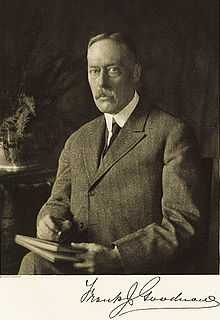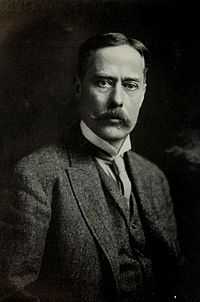Frank Johnson Goodnow
| Frank Johnson Goodnow Ph.D., LL.B. | |
|---|---|
 | |
| Born |
Frank Johnson Goodnow 18 January 1859 Brooklyn, New York, USA |
| Died | 15 November 1939 |
| Occupation | President of Johns Hopkins University |
| Nationality | American |
| Education | Ph.D, LL.B. Columbia University |
| Alma mater | Humboldt University of Berlin |
| Period | 1893–1914 |
| Spouse | Elizabeth Buchanan (1886–1939) |
| Children | 3 |
Frank Johnson Goodnow, Ph.D., LL.B. (January 18, 1859 – November 15, 1939) was an American educator and legal scholar, born in Brooklyn, New York.
Personal life
He married Elizabeth Buchanan (Lyall) in 1886 and had 3 children: Isabel C. (Mrs. E. Kendall Gillett), David F. and Lois R. (Mrs. John V. A. MacMurray).
Education
After private schooling he graduated from Amherst College (A.B.) in 1879 and from Columbia Law School (LL.B.) in 1882. At Columbia, in addition to such subjects essential for admission to the Bar, he took courses in public law and jurisprudence offered in the recently organized School of Political Science. Late in 1882 he was offered a position in the School of Political Science on the condition that he prepare himself with a year of study abroad. He studied at the Ecole Libre des Sciences Politiques in Paris and at the University of Berlin.
Career

Goodnow took up his teaching in October 1884 at Columbia, giving some instruction in History as well as in United States Administrative Law.
Made Adjunct Professor in 1887, Goodnow became Professor of Administrative Law in 1891, and in 1903 Eaton Professor of Administrative Law and Municipal Science. He became the first president of the American Political Science Association in 1903. Governor Theodore Roosevelt made him a member of the commission to draft a new charter for Greater New York, and President Taft chose him as a member of his Commission on Economy and Efficiency.
In October 1912 he accepted, on the recommendation of the Carnegie Endowment for International Peace, the commission of constitutional adviser to the Chinese Government which took him to China in March 1913. During the years 1913–1914 he served as legal adviser to the Yuan Shikai government in China. Yuan had hired Goodnow at the recommendation of Charles Eliot, a former president of Harvard University, and had tasked him with drafting a new constitution. Between 1913 and 1915, Goodnow wrote two versions of the constitution. The first effectively made Yuan president for life, and granted him sweeping powers over the budget and foreign policy. The second version, completed in 1915, would have made Yuan emperor had he not died soon thereafter.[1][2] Goodnow became known for his assertion that the Chinese people were not mature enough for a democratic form of government—a position that was later utilized by Yuan, as he attempted to proclaim himself the Emperor of China in 1915-6.
In 1914 he became the third president of Johns Hopkins University. At Hopkins, he is best remembered for his attempt to eliminate the bachelor's degree by cutting the first two years of undergraduate work. He is considered an important early scholar in the field of public administration and administrative law, as well as an expert in government. Goodnow argued for the centrality of law in public administration. (Other public administration theorists have argued that other non-legal values ought to guide civil servants.)[3]
Goodnow resigned the Johns Hopkins University Presidency in 1929, but thereafter frequently gave graduate lectures in his special subjects. He was for some time a regent of the University of Maryland and a member of the Board of School Commissioners of Baltimore.
Modern Day Award
The Frank J. Goodnow Award for Distinguished Service was established in 1996 to recognize individuals who have made outstanding contributions to both the development of the political science profession and the building of the American Political Science Association.
Bibliography
- Comparative administrative Law (1893)
- Municipal Problems (1897)
- Politics and Administration (1900)
- City Government in the United States (1905)
- Principles of the Administrative Laws of the United States (1905)
- Social Reform and the Constitution (1911)
- Principles of Constitutional Government (1916)
He was editor of:
- Selected Cases on the Law of Taxation (1905)
- Selected Cases on Government and Administration (1906)
- Social Reforms and the Constitution (1914)
References
- ↑ The Economist, "Embarrassed meritocrats: Westerners who laud a Chinese meritocracy continue to miss the point", 27 October 2012.
- ↑ Chenghua Guan, "The Color of Innovation is East Crimson", Harvard Law blogs, 13 October 2012
- ↑ Laurence E. Lynn, Restoring the Rule of Law to Public Administration: What Frank Goodnow Got Right and Leonard White Didn't, Public Administration Review, September/October 2009, pp. 803–812. Retrieved on 2009-09-23.
| Wikimedia Commons has media related to Frank Johnson Goodnow. |
- Pugach, Noel. "Embarrassed Monarchist: Frank J. Goodnow and Constitutional Development in China, 1913–1915." The Pacific Historical Review 42, no. 4 (1973): 499–517. Available via JSTOR.
- The Baltimore Museum of Art. Annual 1 The Museum: It's First Half Century (Baltimore, Maryland: The Baltimore Museum of Art, 1966),46.
| Educational offices | ||
|---|---|---|
| Preceded by First |
President of the American Political Science Association 1903–1904 |
Succeeded by Albert Shaw |
| ||||||
|